Wine Dinners: Showcases or Money-Makers?
By Lenn Thompson, Editor and Publisher
A couple of weeks ago, Nena and I had the pleasure of attending a wine dinner at Mirabelle Tavern, featuring the wines of Lenz Winery. It's always a pleasure to see Lenz's winemaker, Eric Fry and he was hustling his way around the dining room, talking with attendees about each of the wines as they were poured.
And, it's always great to sit down to a meal prepared by chef Guy Reuge, one of my favorite Long Island chefs.
 For me, the pairing of the night (and this was a night filled with well-considered pairings) was Lenz Winery's 2005 Old Vines Chardonnay with
For me, the pairing of the night (and this was a night filled with well-considered pairings) was Lenz Winery's 2005 Old Vines Chardonnay with
Guy's cream of roasted free-range chicken and almond soup with honey (pictured at right). It was a masterful pairing that brought two things that are rarely my first choice — cream soup and barrel-fermented chardonnay — together beautifully.
The other star of the night was the 2001 Estate Merlot, which is tasting great right now. Eric is lucky to be able to get some bottle age on his wines before release. He told me that he doesn't have much of this left, but he's very happy with the 2002 bottling as well.
I get invited to a lot of wine dinners — a lot of them. Without family nearby and only a couple reliable babysitters, actually being able to attend the dinners is rare. But, that doesn't keep me from reading over the menus and seeing what wines the wineries will be pouring.
A couple of the menus I've seen lately got me to wondering — how do the wineries see these events? Are they money makers or are they about showcasing your best for the public? I won't pretend to know the mechanics behind the dinners (how much money the winery gets, if any, for them etc.) but it seems that wineries are all over the place when it comes to what wines they choose. Some seem to really want to put their best foot forward, while others almost seem to be pouring off lesser wines that aren't selling elsewhere.
Take the Lenz dinner. No, Eric didn't pour his 2001 Old Vines Merlot ($55), but he was pouring his sparkling wine ($30) and was not pouring his 2004 cabernet sauvignon (which is underwhelming).
On the other hand, I recently saw a menu for a wine dinner that included a non-vintage red blend, an over-oaked chardonnay and totally ignored the winery's best wines.
Perhaps it's just the local wine lover in me, but I want wineries to pour their best (or at least their near-best if finances dictate) at these dinners. Sending out second-rate and second-label wines seems like a waste of time, unless your only goal is to make a little money and clean out some inventory.
I know that several winemakers and winery owners read this blog, so tell me, how do you approach wine dinners? What are your goals? How do you measure the success (or failure) of these events?





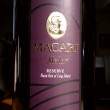
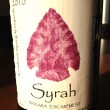
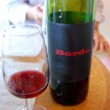
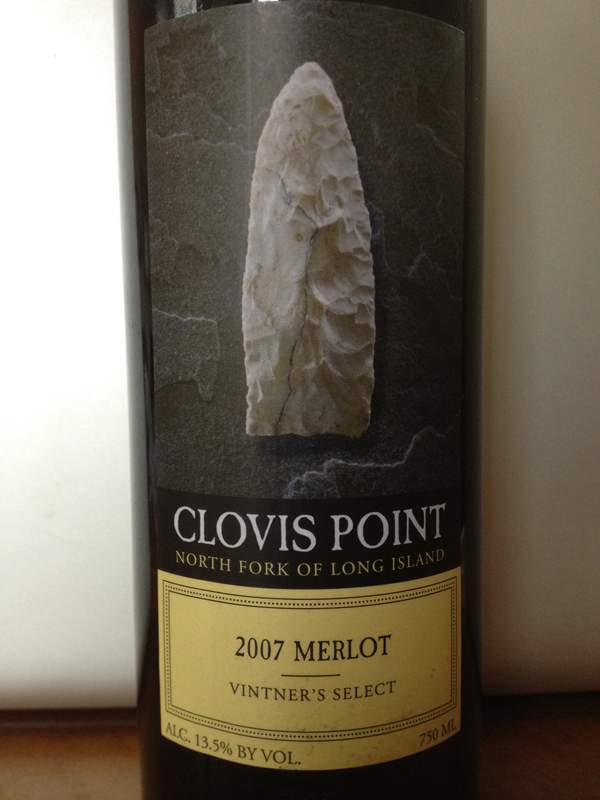
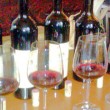
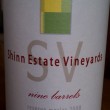
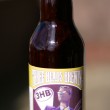
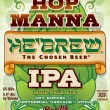

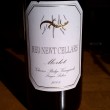


2001 Merlot? Still? A vintage dinner?
A wine dinner should be prepared by both winery and chef. The winery should take time to sit with the chef weeks before and taste through the current portfolio.
The chef should have a full understanding of the capabilities of the winery to enhance the selections.
I believe a wine dinner should provide guests with
a variety of current wines. How many more dinners will I see with Lenz 2001 Merlot, Borghese 2001 Meritage or Merlot?
Don’t get me wrong these are excellent wines and if thats what the theme of the dinner is then fine.
The wineries can’t showcase the 2001 vintage forever.
Lets get the 07′s rolling!
As a marketer I couldn’t help but offer some thoughts. It is becoming increasingly important for wineries to generate buzz for these dinners to fill seats. No longer is it good enough to just have the winemaker in attendance. There must be a unique angle or something truly special about the dinner to sell tickets. Even if wineries see their dinners as marketing tools and not profit centers, there still is the demand to sell out dinners.
I think there is a growing opportunity for wineries to focus their winemaker dinners around a theme. There is certainly more room to focus on the locavore theme. Partner with a couple farms and host a dinner at a spectacular setting and I think it will still bring people out in a tough economy. Another trend I see on the horizon is smaller bite dinners; small portions, both wine and food, to keep the costs down.
Other themes that have potential are varietal themed dinners. During “May is Riesling Month”, one winery in the Finger Lakes is focusing its winemaker dinner around Riesling with each food course paired with a different style Riesling. Another idea is a dinner that is really dessert. Pair 3 – 4 dessert wines with a selection of desserts and you have a unique event at a lower price point.
I couldn’t agree more with Lenn that wineries need to do more than just open their regular bottles. With the tough economy I think wineries have to create dinners with more value. Not necessarily cheaper, but something that is truly unique and memorable.
Suzanne,
Wow, I have the complete opposite reaction to the 2001s. I’m thrilled to be able to taste these wines as they mature and evolve.
I’ve had a number of 2007 merlots, and they are just SO young. Even the 2005s are young. They aren’t showing their best yet, trust me.
Some would call it infanticide to even open them yet.
I think Eric Fry would say so.
To come up with rules and regulations for wine dinners is not necessary. This is an optional dinner that would be good to attend if the food and wine pairing are appealing and the price affordable.
What to serve is very much up to the combined thinking of the restaurant and the winery. Serving older wine is just as good as serving younger wines. The winemaker or the chef could easily clarify what is behind their selections. Cynicism as to whether a winery is trying to move inventory is not well founded given how little wine is used at these rare dinners.
A wine dinner, at its best, is to show what is possible. At times, what is tasted can be wines from the library that may not be available for sale. And that is a great venue for such wines. To taste new releases tasting rooms are open most of the time and many wine stores will offer samples as well. For that reason it is not clear why a wine dinner will have to feature necessarily new releases. Yet there are times where a new release is what is needed for a course.
Finally a wine dinner has to be financially feasible. While it would be desirable to feature a winery’s top wines, it would reduce the bookings, unless the wine is donated. In other cases, less expensive selections make a different point if they successfully support a dish in an unexpected way. Such was the case with a pairing of a less expensive red blend with a monk fish dish. A heavier red would not have worked and the red wine with fish far exceeded expectations. Lenn describes a similar experience with the soup and Chardonnay.
The bottom line is that a wine dinner has to provide pleasure with some education. By that standard it gives the restaurant and the winery a lot of liberty to create a memorable experience.
Charles,
Thanks for the thoughts. Perhaps my “moving inventory” thought was too strong. Instead of clearing out end-of vintage wines, which as you say isn’t really possible given the small amount of wine consumed at these sorts of events, it would have been better stated as wines that a winery is looking to squeeze any last value out of?
What I’m thinking is that, perhaps a wine dinner this time of year, just before 2008 sauvignon blanc or 2008 rose is released, features a 2007 rose. The winery might be ready to release the 2008 but has to “get through” the 2007 first.
To top it all off (and I didn’t mention this in my first post) the pairings seem odd for this dinner. I don’t want to go into any further details though.
I agree with Mr Massoud, if I want to taste your current releases, Ill go to the tasting room (unless of course its a winery from another area). I also agree that the wine dosnt have to be the wineries best, as long as the pairing is good. In that situation its not about the wine (again thats what the tasting room is for) it is about the synergy of food and wine (or wine as food). I think we all agree that wine should be a part of most meals. But if most people want to make that happen they can’t afford to drink a wineries top wines.
On that note, were I to host a wine dinner, as I hope I will many times in the future, I would go in a less formal, less formated approach. You have to have different stratigies depending on who you want to sell your tickets too. For the people who activly seek out knowledge about wine, the typical wine dinner is fine. Here in the Hudson Valley and Long Island, our proximity to NYC makes for some excelent opportunities to market to the various immigrant comminities. One could have a Eastern European theamed dinner, lamb with plum brandy and lots of currants and quark. Or those same buss loads of Asians who arrive for a few weeks a year to pick cherries could easily be catered to with asian cuisine and wine pairings. For the everyday Joe Shmoe not really into wine, you go with the “almost buffet.” The long table with the food served in repeating dishes down the length. Choose a few pairing for the main course and dessert, and let them choose and pour, let them make the best pairing. Make it more of a social dinner with a bit of a cooking lesson to boot. Otherwise you risk enshrinement; when someone is so impressed with the high standard of something, nothing deemed less will do. I know people who have gone to wine dinners, and loved the pairings so much that they wont have that wine unless they can have it with the steak and whatever it was it came with … it just would be the same they say!
In a way, I think the goal of wine dinners should actually be to put wine OFF its pedistal, to incourage people to realize a meal without wine is not a full meal.
PS. Lenn, have you come across any LI Merlots that do show well young? I dont yet have room to amass wine for aging personally, and I cann’t always afford to buy older reserve wines. Who’s style is good for young drinking?
Lenn,
It is a common practice for wineries to release their wines sequentially and wait for a release to be depleted before the next one is released. We do that all the time. I do not see a problem here.
It is also common practice in most businesses where products change year to year.
I doubt that a wine dinner will be organized to speed up that transition, as it is easier and less costly to deplete that inventory, we are talking about 1 case of wine here by the way, by offering an incentive in the tasting room.
And as stated a wine dinner will barely help with inventory depletion and speaking for myself I do not see it as a driver. What is important is for the pairing to work. If it does then winery and restaurant have collaborated successfully. You may be giving wineries and restaurants too much credit at being so clever at trying to accomplish multiple goals with one dinner.
A wine dinner works for the winery if it leaves the participant with a better appreciation of that brand or the varietal. It is a long term cultivation of loyalty rather the expectation of a short term dividend.
Charles,
Of COURSE it’s a common practice. I’m not saying its not, nor am I saying that it doesn’t make sense.
I also don’t think that anyone is setting up wine dinners specifically to move through inventory. If that is what you got from my comments, please ignore them.
Maybe I’m completely off my rocker here (it happens, certainly) but looking at the particular menu in question, the pairings are underwhelming and in some cases odd. I’m trying to understand why they were done this way.
I’m glad to hear more about how Paumanok views and plans its dinners, but I’m not convinced that it’s the norm.
Lenn,
Wine dinners are not for profit, but for brand recognition and education of a wine region. Having attended many wine dinners in many different wine regions, the ones that stand out the most are not always those that showcased the “costliest” wines but the ones that showcase the winery’s portfolio.
This Friday we are sponsoring a Wine Dinner with the SCCC Culinary Arts & Hospitality Center featuring Macari Wines, not all of which are vintage, but new releases.
We are honored to be doing this wine dinner, not only to showcase Macari Wines, but the talents of the young chefs that are the future of the Culinary & Hospitality Industry of this Wine Region!
We would have loved to invite you as our guest to experience the well selected food & wine pairing in this Southwestern Inspired Menu, but it is sold out, as was the previous Macari Wine Dinner hosted by The Jamesport Manor Inn.
Till the next one!
http://www.macariwines.com
Alex, thanks for offering your insight on the topic.
As I mentioned in the original post, it’s very hard for Nena and I to get to these types of events right now, but I would welcome the opportunity to attend a Macari dinner in the future. What new releases are you showing at this event?
See you in a couple weeks (I assume we’ll see you at Shinn as a part of TasteCamp, yes?)
“The wineries can’t showcase the 2001 vintage forever.
Lets get the 07′s rolling!”
As I’ve said, wineries often release and consumers drink wine too young-2007 indeed. Babies.
Suzanne, when did it become a negative for a wine to mature in the bottle?
Yes, wine dinners are for brand rec and for education, first and foremost.
It was at a wine dinner where I once persuaded a whole crowd of know-it-a, er, geeks, uninterested in trying wine with their salad that semi-dry or Auslese Riesling can make a great pairing with salad-provided the dressing is of a fine balsamic vinegar base.
If I had my druthers, and when i did have them as a sales rep, I loved putting products forward at wine dinners with a theme.
It’s questionable if a winery can make money with a wine dinner. A few months ago I went to a wine dinner with Randall Grahm of Bonny Doon. My first thought on a cold NYC winters night is wouldn’t Randall rather be back home on the ranch right now?
I was enthralled with the dinner and the wines. There were no “dogs” in the line. There were some “library” wines to show how his wines age. But I doubt he made any money on it.
But it did fill thirty seats on a Monday night in a restaurant that poured his wine. The restaurants wine director, Paul Greico has a wine bar a few doors down that of course sells his wine. And Randall was able to tell his story about Biodynamic wines and the changes at his winery.
I found my fellow guests to be very similar to visitors at most tasting rooms. Some were very interested in the wine and what was being said. Others came as a group, weren’t rea1ly engaging with the hosts and just seemed to be there for a good time.
I think for the winery they have to have more than one goal for a wine dinner because it’s to hard to get people so engaged that they will run out and but a case of your wine and tell all their friends to do the same.